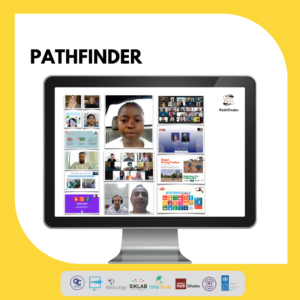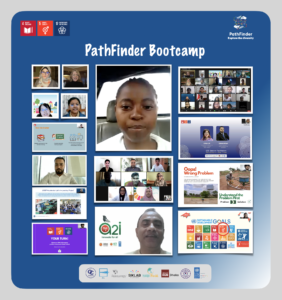Wahid and Koshika are longtime Resolution Fellows that have both founded successful ventures, TigerBow and seHER, through the Resolution Fellowship. Now, they are partnering up to launch PathFinder, a new venture aimed at providing entrepreneurship skills to young students in several countries. Read on to learn more about their journey and how the Resolution community has helped them create this new initiative.
Please introduce yourselves!
I am Wahid Hossain, currently working on a couple of social enterprises which are focusing on secondary level education in Bangladesh & globally. One of my recent initiatives is PathFinder where I am the Program Director & Co-founder.
My name is Koshika Krishna, I am a Class 9 Resolution Fellow. I am the founder of my non-profit organization SEHER that addresses gender and health related issues in India through strategic legal interventions. I am also currently working as the Regional Manager for Asia/Oceania at Peace First an organization supporting youth led social change movement through mentorship and micro grants.

Wahid Hossain, Koshika Krishna, and Saje Molato, a Resolution Fellow who also co-founded Pathfinder
When did you join the Resolution community?
Wahid: I have been a part of The Resolution Project since 2014. I participated in the Social Ventures Challenge of The Resolution Project at Harvard National Model United Nations in 2014.
Koshika: I joined The Resolution Project through the SVC at WorldMUN in 2017!
How did the three of you meet?
Wahid: The PathFinder initiative has been created in collaboration with multiple Resolution Project Fellows. I am the Program Director & co-founder of PathFinder. Saje Molato, who is also a Resolution Fellow, is the program lead in the Philippines. We have collaborated with Koshika through Peace First to further support the young people who are a part of our program. We all belong to South Asian backgrounds and have been connected with the Resolution community for years now. Saje & I have known each other for more than three years! As Saje is working on youth education, and I was developing one of my educational ventures named BeyondGrades, we had a conversation regarding different social challenges both the Philippines & Bangladesh are facing. I reached out to Saje to discuss my approach with BeyondGrades to understand how I can make it more impactful and effective for my beneficiaries. While discussing these ideas, we thought of collaborating to jointly design this program called PathFinder.
Koshika is also working with this age group through “Peace First,” a non profit organization that supports youth led social change movements through mentorship and mini-grants. I talked with her about our initiatives and she highly encouraged us to consider it as a great project and to work with Peace First as a partner. Now, as the three of us are working here – Saje’s contribution is to manage students in the Philippines for PathFinder, Koshika is providing financial support and mentorship to our beneficiaries to create a prototype of their ideas, and I am running the programs from Bangladesh and maintaining our partnerships.
Why did you decide to work together? What inspired Pathfinder?
Wahid: First of all, Saje and I work in the education sector with youth whose age is between 12 to 16. So, it was obvious to us that we shared a lot of resources, knowledge, and expertise, and that inspired us to think about creating this program together.
We also can leverage our resources as we both are Resolution Project fellows, and also through Resolution, we got the fellowship under the OC365. We share similar sorts of cultural values and challenges because we are both from south-east Asia. That’s why we thought about coming together and creating this. Koshika also shares a neighboring country, India, with me as well as Saje. We also had a similar kind of working experience, as she is working for the youth and provides the grants. Her organization & her own experience perfectly matched our project PathFinder. That’s why we all thought of coming together to work on this venture.
Koshika: I am keen on collaborating with Wahid and Saje through Pathfinder because it is bringing young people in Asia the guidance, technical skills and support required to launch social change projects and build entrepreneurial skills. I believe our countries are still stuck in very traditional areas and methods of learning and do not provide space for creativity, problem solving and entrepreneurship in the way this program does. By giving the guidance that young people need, this program gives them the confidence to independently address issues in their community!
What is the challenge Pathfinder seeks to address?
Wahid: PathFinder teaches sustainable development goals, entrepreneurship, design thinking, and how to create a team oriented mentality. In developing countries, education is very challenging. Many receive an education that has very limited application in reality. Since the COVID-19 pandemic started, we all learned how dramatically industry opportunities are changing and the social challenges and needs are becoming very different. So, PathFinder helps students to be qualified and get the essential skills required to have employability as well as become an entrepreneur. Also, we introduced the UN sustainable development goals specifically focusing on how regional partnership and sharing resources can enhance productivity and create a large-scale impact — that’s something we focus on more. Through this process, students learn the skills that will help them find sustainable jobs or become entrepreneurs to make a long-lasting impact on society.

Have any of you been personally affected by this issue? If so, how?
Wahid: The issue I am highlighting here is very personal for me because I completed my primary, secondary & bachelor academic education in Bangladesh. This education itself was not helpful for me and I was not satisfied with the system as it did not give me the confidence and essential skills I needed to become a social entrepreneur. I am very happy & proud that I received The Resolution Project fellowship that provided me with mentorship and other resources to help me to become a social change-maker & entrepreneur along with establishing my enterprise “TigerBow.”
The journey for Saje was pretty similar. In the Philippines, the education they receive is not enough to find desired jobs and become a social change-maker. His life has dramatically changed through The Resolution Project fellowship. So, we both experienced that our education was not good enough to address & meet the challenges we have in our society. We all are very motivated and want to work but unfortunately, our primary, secondary & bachelor-level education is not enough.
Koshika: I have a similar story to that of Wahid and Saje. Our education system is rigid and does not create opportunities for learning outside of the traditional avenues. It was only after winning the Resolution fellowship and being connected with multiple other opportunities for growth as a young change-maker did I realize that this can also be a career option, that this does not need to just be a voluntary engagement. Furthermore, I believe there are very few spaces where young people are given the tools and guidance to go out and independently explore and create change. Often the idea is to build them up as the leaders of tomorrow, not today. Pathfinder wants to change that narrative.
How is Pathfinder addressing these challenges?
PathFinder is a cross-culture exchange program where we are providing the resources that have practical experience working with SDGs along with social entrepreneurship and design thinking. We are creating a pool of facilitators for professionals working for development sectors as well as commercial companies. We are integrating educators who have experience in designing curriculums for teaching professions. These are the people from different parts of the world who’ve been involved with an innovative education system. So, our approach is very simple. We give participants the essential skills to become an entrepreneur while also giving the bits of knowledge, resources, and information regarding the social challenges under the SDGs. We are also creating a platform or environment where students from different parts of the world can come together to explore these ideas and share their knowledge, experiences, and expertise to create something meaningful. This is why our approach is effective.
We have run a pilot project where we’ve seen the success we have made. Also, each of the organizations behind creating PathFinders and the core team have the experience working with kids and creating successful entrepreneurial programs. This is not just a program, it is a way to create social change-makers by bringing & ensuring social impacts.

What have you enjoyed the most about collaborating on this project?
First of all, we are Resolution Project fellows and apart from this professional relationship, we are friends. We’ve had strong bonds that we have shared for a long time. We all are similar minded and we want to contribute to our community in the world and we are very much driven by innovation. So, this is very interesting and enjoyable for all of us. We share our knowledge, thoughts, and innovation. We have similar understandings and skill sets, so it becomes so much easier compared to working with outsiders. We wanted to create a joint collaboration where Resolution Project Fellows come from different parts of the world and work together instead of working on individual projects which take a lot of effort, resources, and time. The coming together of 3 Resolution Project Fellows sharing their strength and resources helped to create PathFinder so fast.
Koshika: We started at the end of 2021 in September. The idea, though not very well defined at the time, was simple. In just 3 months, we were able to run this boot camp and I strongly believe that the similar experiences that we shared is the reason that it was easier for us to execute. We have enjoyed this journey and are very excited about the 3 of us, how we can grow, and we are even looking forward to adding many other Resolution Project fellows through this program or maybe something else.
What challenges have you faced while starting this project?
The most important challenge we have faced is determining the most effective approach to connect the students from different parts of the world. These students have different social backgrounds, languages, cultures, knowledge, beliefs, and we had to figure out how we can make a classroom where we ensure that the students jointly enjoy this whole process. That was very challenging, and we continuously had a conversation with each other to understand the cultural context, social challenges, and educational system between the 3 countries.
Secondly, as it is just not a partnership between these 3 Resolution Project Fellows, we need institutions who can provide facilitation to the vast populations and after the program, the students’ projects, organizations & institutions are going to be supported with resources, money and other ways for creating a viable prototype.
Collaborating and managing funds onboarding various partners such as UNDP Accelerator Lab, Peace First, Impact Hub Dhaka, and many others is always a challenging task. We will be facing challenges that require financial commitment from one of our partners to support these programs for a longer time.
How has the Resolution community impacted your journey?
Wahid: As an entrepreneur, I don’t believe that I could have pursued this journey without the help of a Resolution fellowship. My home country education was not enough for me to become who I am today. The education that I received was an approach to the traditional learning process where I needed to memorize instead of creating things by myself. I was not confident enough with my thoughts and the knowledge that I have or in the effectiveness of my ideas. So, over the years this fellowship has given me mentorship, and through this mentorship, I understand how to work on a problem and create solutions. While creating solutions, I learn how I can engage stakeholders to start making my ideas a reality. All these things happened through the education I received from the fellowship. Also, Resolution directly connects me with external organizations & resources to help me on each of the projects that I have been working on for the last 7 years.
Koshika: Resolution has provided me the confidence to go down the career path of change-making. As a middle-class woman from South Asia, this has been a daunting and challenging career path to take and it would not have been possible without the support and education I have had through this fellowship. Most importantly, it has given me a community of passionate young people leading change in their countries to rely on and collaborate with!
What advice would you give other young entrepreneurs looking to collaborate on a project?
We think that new entrepreneurs should always look for who else is actually working on their idea or issue and how they can learn from them to make necessary corrections and take advantage of that. There are more than 500 Fellows covering almost every industry. When young entrepreneurs are working on an idea or a problem, they should always have a conversation with their peers to learn why they are using a certain strategy. One of the other key elements a Fellow needs to focus on is that, when you’re doing something new, the most important thing is to start with the small steps. Through these small steps, you will also learn from your failures and grow, so one day you are prepared to go for the big one.
